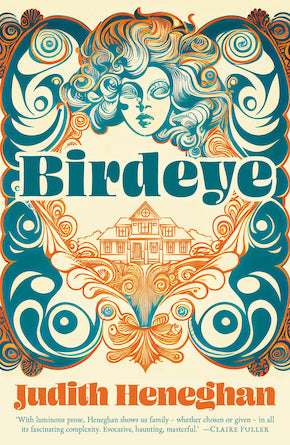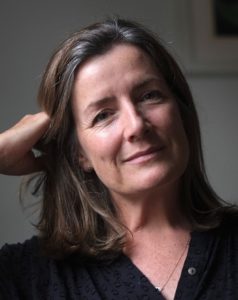Catskills karma
by Judith Heneghan
In 1973 my family spent a summer in the Catskills, upstate New York. One afternoon I peeped through the fence of our front yard as a woman with long yellow hair lay down in the middle of the road. My mother said there was a house near the river where the hippies lived. They did things like that.
I’ve often wondered what became of the long-haired woman. Did she sell out and move to the suburbs, or stay true to the counterculture? My new novel, Birdeye imagines what might have happened to those of the Woodstock generation who didn’t abandon their peace and love beliefs. The setting is a fading commune, well past its heyday, and the location is a valley nestled amongst the Catskill High Peaks.
Full disclosure: I’m British, not American, but I have returned several times to this small nub of the eastern Appalachians, chock-full of dark lakes and forested summits, rushing creeks and quiet hamlets. It is a place of shift and myth-making, from the colonists arriving in the lands of the Iroquois and Algonquin peoples, down to Yasgur’s Farm and beyond. Along the way, its hidden valleys drew in any number of religious sects with their visions for remaking themselves and the world. The woods and hillsides brought tanners and miners, but also post-Enlightenment artists with their search for the picturesque, and intellectuals with experiments in communitarian living. Later, as travel became easier, summer camps and hotels sprang up for those fleeing the disease and humidity of New York City, until Dylan and Baez breezed in, and the hippy vibe was immortalised.
Into this setting, then, steps Liv Ferrars, the central character in Birdeye, an eighteen-year-old from England who arrives on a camp counsellor’s visa in the summer of 1969. She builds the Birdeye Colony around her fragile family, and lives there for fifty years until one day a young stranger shows up, asking odd questions. His presence plunges the last remaining Birdeyers into crisis, and Liv is forced to confront painful secrets as the consequences of her life’s work play out amongst those she loves most. Indeed, tolerance is one of the novel’s themes. ‘Be attentive,’ Liv implores, but to whom, and to what?
I made several trips to the Catskills at different times of the year, in order to fossick along the trails, attend town boards and sit in diners asking more questions than is polite.”
I have long been fascinated by communes and radical experiments in living differently. In my early twenties I spent two years at Little Ewell near Dover. Assistants such as me lived alongside people with learning disabilities, sharing work, leisure and living space. We weren’t paid a wage, but we had a little pocket money. It was a benign community, with established structures and compassionate leaders. Each evening, we gathered around a candle flame and sat in silence or spoke about how we felt, in a way that would be recognisable to many religious communities and which I have borrowed for my novel. My time there was enriching but also confining; eventually, I moved on. Later, writing Birdeye, I drew on my experiences of idealism tempered by frustration, and acceptance tempered by guilt.
For Liv, these complexities become catastrophic.
My modus operandi, then, is to set characters down in a place they know, or don’t know, and ask ‘what next?’ Place comes before plot, and with Birdeye I did my research; I made several trips to the Catskills at different times of the year, in order to fossick along the trails, attend town boards and sit in diners asking more questions than is polite. Nevertheless, bringing a location to life is always more than filling a notebook with practical information about state troopers and what happens to the trash, even while such details can themselves morph into plot points. The key for me is how my characters navigate and interact with that place. What do they need from it? Mishti, one of Liv’s oldest friends, seeks consolation in the stains and scuffs the house wears. Liv stakes out her territory by walking or driving along its perimeters, while Conor is continually looking for signs.
This last point led me to a specific language of place that chimed with the story I wanted to tell.
The Catskill Forest Preserve, like many state parks, is littered with messages. There are signs about where to walk and the dangers ahead. Hikers leave advice in trail boxes, while the public noticeboards are full of information about lost puppies and burn bans and river restoration. There are plenty of counterculture slogans, too, scattered like old leaves along roads, slapped on mailboxes, tattooed into flesh. As I mapped out the Birdeye Colony’s geography I took photographs or scribbled down all the messages I stumbled across, and when I looked at them afterwards, out of context, they took on unexpected inference: ‘Do not proceed without crampons’ or ‘Former site of Olive’ or ‘If not you, then who?’
As a way of sifting material and organising my thoughts I started to use these found phrases as writing prompts, which then coalesced into chapter titles. I’ve always loved novels with chapter titles. There’s something performative about them, like a stage direction or an arcane portent or, sometimes, an exhortation, reminding readers that we, too, are involved here. A good chapter title never tells us what’s coming. It should add an extra layer to the narrative; it can hint, or offer a glimpse, or tease or even create a whole new narrative of its own.
In Birdeye, ‘Pursuant to a judgement of foreclosure’, ‘Please enter through the other door’ and ‘People who make their own drama deserve their own karma’ are personal favourites. I hope they act like slightly twisty autosuggestion or shadow dialogue, as well as lending voice to an extraordinary place. My novel belongs in the Catskills. I couldn’t have set it anywhere else.
—

Judith Heneghan is a writer and lecturer. She spent several years in Ukraine and Russia with her young family in the 1990s and has written extensively for young people. She now runs the MA Creative Writing programme at the University of Winchester and mentors via Jericho Writers. Her first novel for adults, Snegurochka, set in Kyiv, was shortlisted for the 2020 Edward Stanford Travel Writing Awards. Birdeye is out now in paperback from Salt.
Read more
judithheneghan.co.uk
@JudithHeneghan
@saltpublishing
Author photo by Paul Ayling

